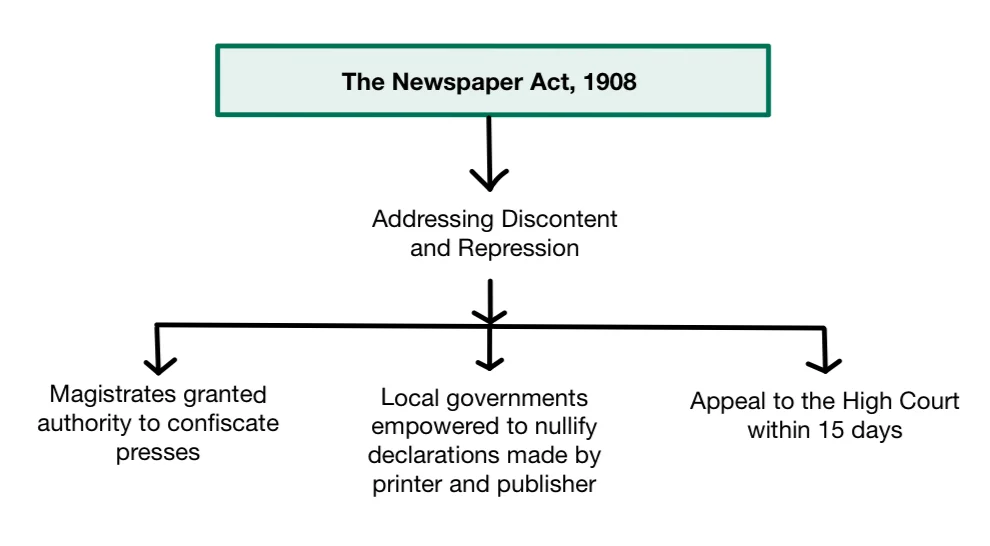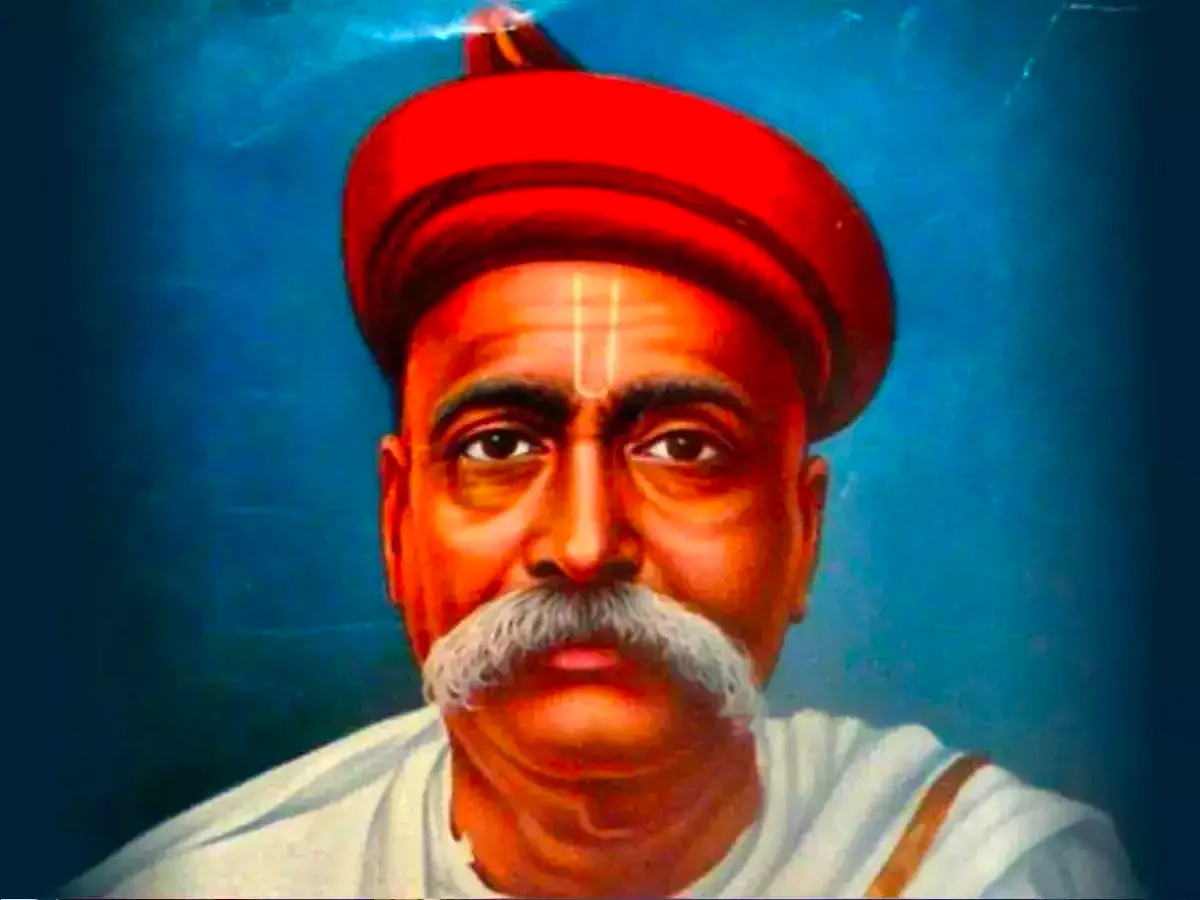The press in India played a crucial role in the nationalist struggle, especially during the Extremist phase. Leaders like Bal Gangadhar Tilak used newspapers to mobilize public opinion and challenge British colonial rule. However, the British government responded with several repressive laws aimed at curbing press freedom and stifling dissent, such as the Vernacular Press Act, the Newspapers Act of 1908, and the Indian Press Act of 1910.
Press Freedom and the Struggle for Independence: The Role of Journalism During the Extremist Phase
Bal Gangadhar Tilak: Champion of Press Freedom and Nationalism
- Tilak’s Role in Nationalist Struggle: Bal Gangadhar Tilak is often closely associated with the nationalist struggle for press freedom.
- He had been nurturing anti-imperialist sentiments among the public through various initiatives, including Ganapati festivals (commenced in 1893) and Shivaji festivals (initiated in 1896), as well as his newspapers Kesari and Maharatta.
- Tilak was one of the pioneers in advocating the inclusion of the lower middle classes, peasants, artisans, and workers within the Indian National Congress.
- Statewide Campaigns and Popular Movements: In 1896, he organized a statewide campaign in Maharashtra to boycott foreign cloth in opposition to the imposition of excise duty on cotton.
- In 1896-97, he launched a no-tax campaign in Maharashtra, urging farmers to withhold the payment of revenue if their crops had failed.
- Public Discontent during the Plague Outbreak: In 1897, an outbreak of plague occurred in Poona, and while Tilak supported the government’s measures to combat it, there was widespread public discontent over the harsh and heartless methods employed, such as segregation and house searches.
- This unrest culminated in the murder of the chairman of the Plague Committee in Poona by the Chapekar brothers.
- The government’s policies on tariffs, currency, and famine also fueled this popular discontent.
- Government Repression and Tilak’s Arrest: The British colonial government was actively seeking an opportunity to curb this militant trend and suppress dissent in the press.
- They decided to make an example of Tilak by targeting him for arrest.
- Tilak was apprehended after the assassination of Rand, based on the publication of a poem titled ‘Shivaji’s Utterances’ in Kesari and a speech he had delivered at the Shivaji festival, where he justified Shivaji’s killing of Afzal Khan.
- His conviction and 18-month sentence sparked nationwide protests.
- Simultaneously, several other newspaper editors in the Bombay Presidency faced trials and received similarly severe sentences.
- Rise as a National Hero: These actions by the government prompted widespread protests.
- Overnight, Tilak became a national hero and earned the title of ‘Lokmanya’ (honored and respected by the people).
- He emerged as a new leader who led by example.
Enroll now for UPSC Online Course
Mandates of Section 124A and 153A
- Amendment of Section 124A and Introduction of Section 153A: In 1898, the British government amended Section 124A of the Indian Penal Code and introduced Section 153A, which criminalized acts intended to bring contempt to the Government of India or incite hatred among different social classes, particularly in relation to the English in India.
- National Protests Against the Amendments: These legal changes, aimed at suppressing dissent and curbing nationalist sentiments, triggered widespread protests across the country, further fueling the growing resistance to British colonial rule.
Swadeshi Movement and Related Press Acts
During the Swadeshi and Boycott Movements and the rise of militant nationalist sentiments, several repressive laws were enacted by the colonial government to suppress dissent and curtail the freedom of the press. One of them was the Newspaper (Incitement to Offenses) Act, 1908.
The Newspaper (Incitement to Offences) Act of 1908
- Lord Curzon’s Unpopular Policies: The period of Lord Curzon’s rule was marked by the introduction of several unpopular policies, leading to widespread discontent.
- Rise of the Extremist Party and Acts of Violence: This environment of disaffection gave rise to the Extremist Party within the Indian National Congress, accompanied by acts of violence.
- The newspapers of this time frequently criticized the government’s policies.
- Criticism of Government Policies in the Press:During this time, newspapers frequently criticized the government’s actions, amplifying public dissatisfaction and providing a platform for nationalist sentiment.
- Enactment of the Newspapers (Incitement to Offences) Act of 1908: In response to these developments, the British colonial government pursued a repressive approach and enacted the Newspapers (Incitement to Offences) Act in 1908.
- The Newspaper (Incitement to Offences) Act of 1908 was introduced with the specific aim of countering extremist nationalist activities.
Provisions of the Newspapers (Incitement to Offences) Act of 1908
- Confiscation of Printing Presses and Related Property: The magistrates were granted the authority to confiscate printing presses and related property connected to newspapers that published objectionable material inciting murder or acts of violence.
- Power to Nullify Declarations: The local Governments were empowered to nullify any declaration made by the printer and publisher of an offending newspaper under the Press and Registration of Books Act of 1867.
- Right to Appeal to the High Court: Newspaper editors and printers were given the option to appeal to the High Court within fifteen days of the order for the forfeiture of the press.
Rise of Political Consciousness During the 1908 Press Act
- Arrest and Imprisonment of Bal Gangadhar Tilak: Bal Gangadhar Tilak, a prominent leader of the militant nationalist movement, was arrested and tried for sedition under this Act.
- He was subsequently transported to Mandalay in Burma for a six-year sentence.
- Nationwide Protests and Clashes in Bombay: This arrest and imprisonment sparked nationwide protests.
- In Bombay, textile workers and railway workshop employees clashed with the Army in the streets and went on strike for several days.
- Recognition of India’s Working Class by Lenin: This event received recognition from figures like Lenin, who hailed it as the Indian working class’s entry onto the political stage.
- Government Action Under the Newspapers Act of 1908: Under the Newspapers Act of 1908, the government initiated legal proceedings against nine newspapers and confiscated seven presses, reflecting its efforts to curb dissent and criticism in the press during this period of heightened political tension.

Indian Press Act, 1910
In 1910, the Indian Press Act was enacted, which essentially resurrected the most objectionable features of the Vernacular Press Act (VPA).
Provision of the Act:
- Security Requirements and Penalties for Publishers: Under this Act, local governments were authorized to demand security at the time of registration from printers and publishers, which could be forfeited or lead to the deregistration of a newspaper if it published objectionable content.
- Demand for Security: Demand security ranging from Rs. 500 to Rs. 2,000 from the custodians of printing presses or publishers of newspapers.
- Forfeiture and Deregistration: Forfeit the security and cancel the registration declaration of a newspaper found in violation of the Act.
- Free Copies to the Government: The Act further required every newspaper’s printer to provide the government with two free copies of each issue of the newspaper published.
- Submission of Copies to Local Government: Also the printer of a newspaper was required to submit two free copies of each issue to the local government.
- Fresh Registration and Security: The government could also permit fresh registration and impose security ranging from Rs. 1,000 to Rs. 10,000, with the authority to forfeit the fresh security and annul the fresh registration declaration, as well as confiscate the press and all copies of such newspapers and books if the publication persisted in printing objectionable material.
- Right to Appeal: In case of grievances, the affected party had the right to appeal to a Special Tribunal of the High Court against forfeiture orders within two months.
- Authority to Detain Imported Packages: It also granted the Chief Customs Officer the authority to detain imported packages containing objectionable material.
- Government Actions Against Printing Presses and Newspapers: Under this Act, the government took action against 991 printing presses and newspapers.
- Among these, 286 were issued warnings, and in 705 cases, substantial security deposits were demanded.
- Over the first five years of the Act, the government confiscated securities amounting to approximately five lakh rupees.
- Defence of India Rules: During the First World War, from 1914 to 1918, the Defence of India Rules were instituted.
- These rules extended beyond war-related purposes to include the suppression of political agitation and free public criticism.
Repeal of The Press Acts of 1908 and 1910
- Establishment of the Press Committee in 1921: In 1921, a Press Committee was established, chaired by Sir Tej Bahadur Sapru, who was the Law Member of the Viceroy’s Executive Council at the time.
- Recommendations of the Press Committee: The committee was tasked with evaluating the operation of press laws.
- Based on the committee’s recommendations, the Press Acts of 1908 and 1910 were repealed, signaling a significant change in the regulatory framework governing the press in India.
| VIEWS | |
| Bal Gangadhar Tilak
“The government has converted the entire nation into a prison and we are all prisoners. Going to prison only means that from a big cell, one is confined to a smaller one.” |
 |
Enroll now for UPSC Online Course
| Must Read | |
| Current Affairs | Editorial Analysis |
| Upsc Notes | Upsc Blogs |
| NCERT Notes | Free Main Answer Writing |
Conclusion
Despite the government’s efforts to suppress the press, the resilience of journalists and leaders like Tilak ensured that the press remained a powerful tool in the fight for independence.
- The eventual repeal of these repressive laws in the 1920s marked a victory for press freedom in India and highlighted the importance of the media in shaping the country’s future.
Sign up for the PWOnlyIAS Online Course by Physics Wallah and start your journey to IAS success today!
| Related Articles | |
| Bal Gangadhar Tilak | The Swadeshi and Boycott Movement |
| Local Government in India: Catalysts of Social Change and Panchayati Raj Evolution | High Courts in India |

 GS Foundation
GS Foundation Optional Course
Optional Course Combo Courses
Combo Courses Degree Program
Degree Program









